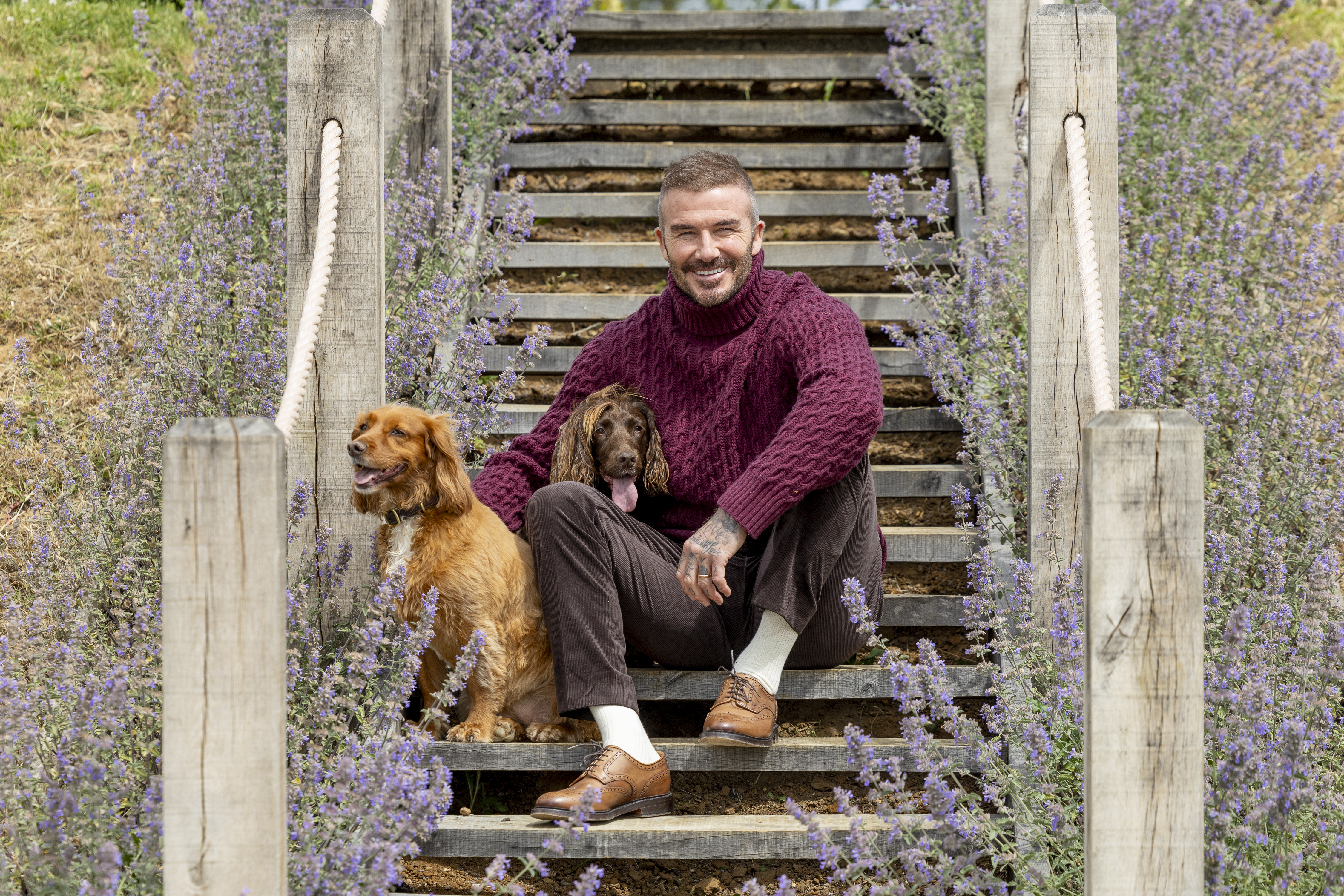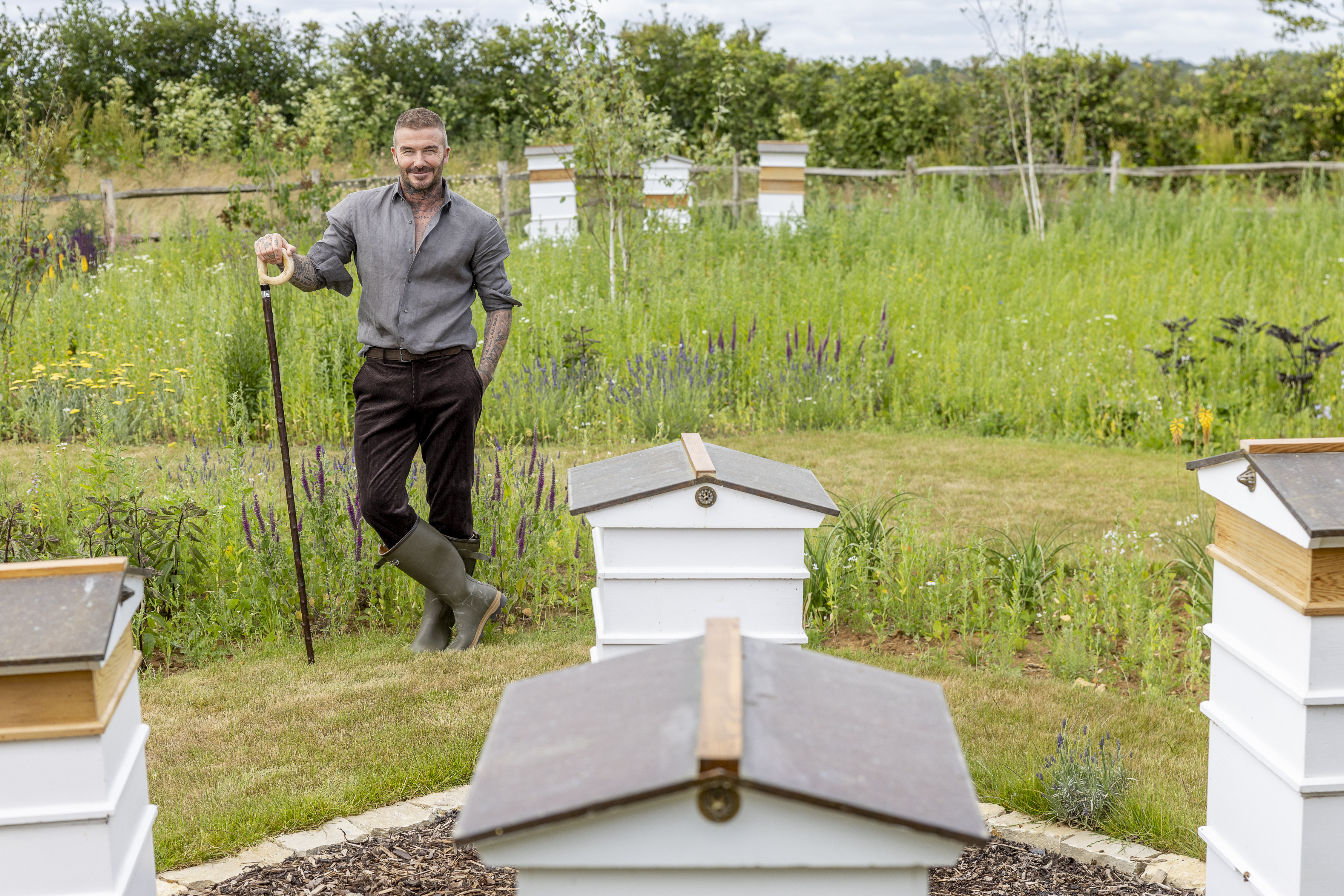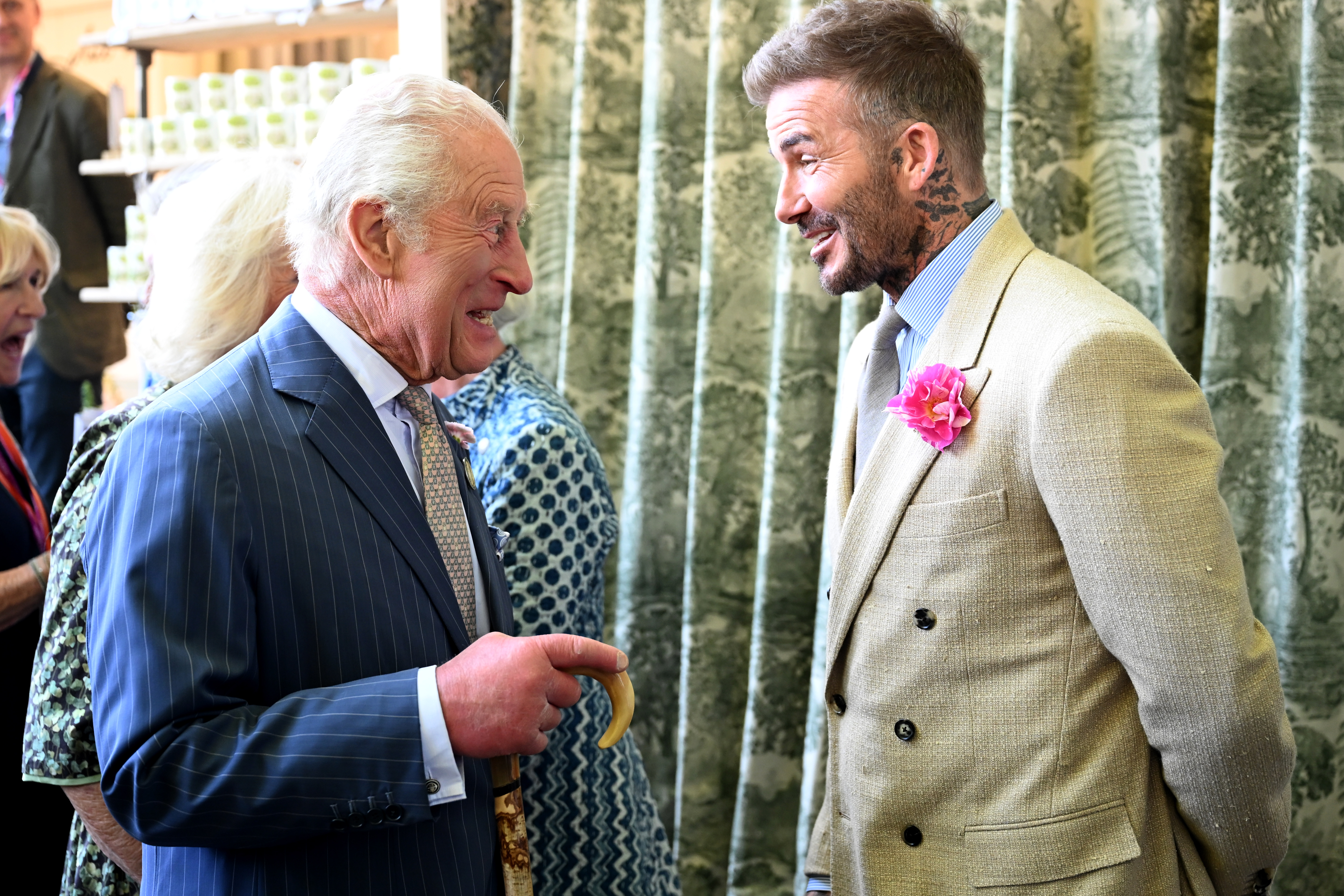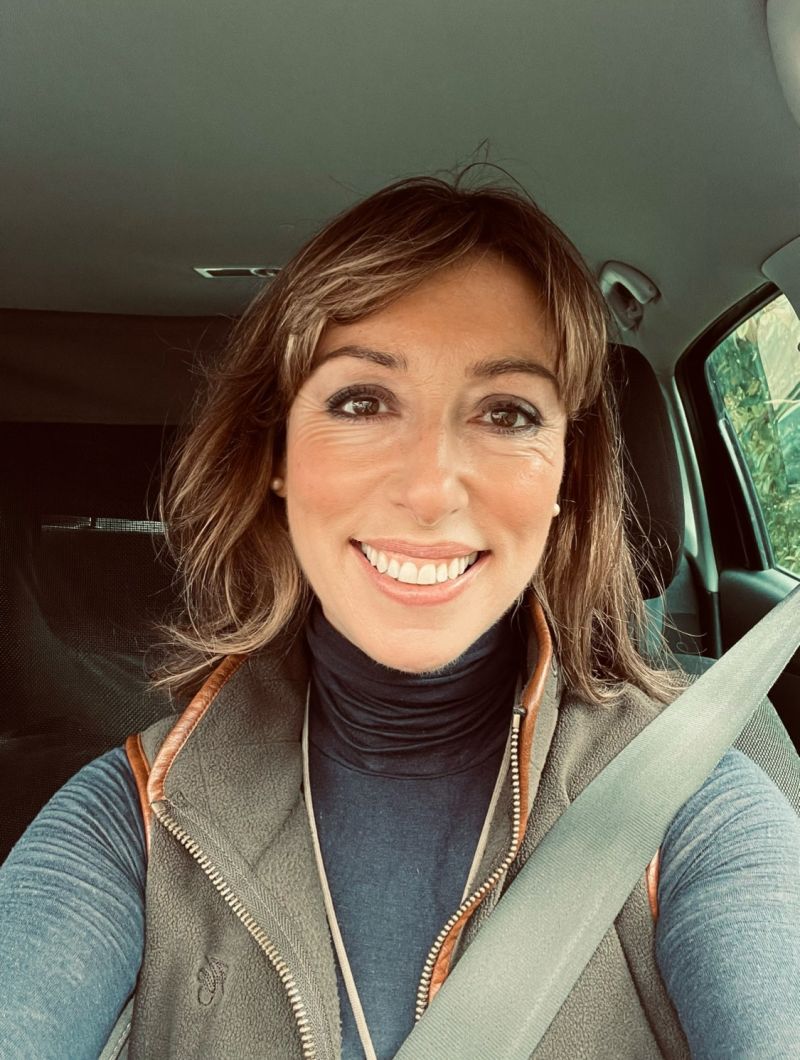'It makes me feel as if I’ve done a good job as a father and that I did the right thing in wanting us to have a house here': David Beckham on why the countryside matters so much to him and his family
Sir David Beckham talks to Paula Minchin about discovering the joys of beekeeping and gardening.


Sir David Beckham is striding towards us, picking his way through the carefully tended raised beds of vegetables and flowers at his immaculately kept home in Oxfordshire. He looks every inch as well groomed and stylishly dressed as we would expect the internationally acclaimed footballer-turned-businessman to be. Yet, within minutes, he’s on his hands and knees, picking broad beans and offering them around with the sort of glee and pride shown by someone who, despite having achieved many great things in life, now takes delight in growing their own produce.
We’re at David's weekend house in the Cotswolds in mid June to photograph and interview him for this special edition of Country Life, which has been many months in the making. From the moment that our editor-in-chief, Mark Hedges, first met David three years ago, he quickly realised that one of our greatest footballers had developed such a deep affection for the countryside, together with a desire to manage the 26 acres that envelop his home near Chipping Norton for wildlife, that he would be the perfect candidate to be the next guest editor of the magazine.
‘It’s an immense pleasure to be asked to do it,’ David beams. ‘Yesterday evening, the children said: “Dad, why are you not coming back to London with us?” I replied: “Well, because Daddy’s doing a shoot for Country Life tomorrow.” And they were like: “Oh my, God — isn’t that your favourite magazine?”’
He has, in fact, ‘been reading Country Life for most of my life’: ‘I used to travel with it wherever I went when I was playing,’ he reveals. ‘My teammates would go for GQ, but I used to pick up Match magazine, which is obviously about football, and Country Life. I always thought (and still do) that there was something comforting about it, even before I had a history with the countryside.’

David celebrates after scoring the third goal in the 1996 FA Charity Shield between Manchester United and Newcastle United at Wembley Stadium, in 1996.
In an illustrious career that spanned 20 years with some of the world’s most successful clubs (Manchester United, Real Madrid, AC Milan, LA Galaxy, Paris Saint-Germain and, of course, the England team, which he captained for six years), David was the first English football player to win league titles in four countries: England, Spain, the USA and France. Since retiring from the game in 2013, he has worked with leading brands, such as Adidas, Hugo Boss and Stella Artois, and is still involved in football through his co-ownership of Inter-Miami CF in the US and Salford City Football Club here in the UK. Long committed to projects that strive to better people’s lives, David has been a goodwill ambassador for UNICEF for 20 years and, earlier this year, was awarded the Crystal Award at the World Economic Forum in Davos for his efforts in promoting and protecting the rights of vulnerable children. He is also ambassadorial president of the British Fashion Council and, last year, became an ambassador for The King’s Foundation.
All of which is a far cry from David’s upbringing in east London, where he lived in Leytonstone, from birth for eight years before moving to Chingford in Essex — where he had a weekend job as a ‘potboy’ (collecting glasses and emptying ash trays) at the Walthamstow greyhound racing track. ‘I didn’t really know the countryside when I was a child,’ he admits. ‘We used to go on holiday to Southend-on-Sea, Camber Sands and Canvey Island or Butlin’s at Bognor Regis with our grandparents. My earliest memories of doing anything in the countryside are of when I was a cub, then a scout, and we used to go camping in Epping Forest. Like most young boys, I loved learning about trees and insects and how to start fires.
‘My grandparents lived their whole lives at Seven Sisters in East Sussex, so they were more in the countryside. We used to go every weekend like clockwork. On Saturday morning, my mum would bundle me and my sisters (Lynne and Joanne) into the car and we’d go to spend the day with them.’
Exquisite houses, the beauty of Nature, and how to get the most from your life, straight to your inbox.
His father, Ted, was a kitchen fitter and his mother, Sandra, a hairdresser, so when it comes to understanding where his interest in gardening came from, David credits his maternal grandfather with passing on his green fingers, albeit unknowingly: ‘It must have come from my Granddad Joe, as my parents were never gardeners. Nobody in my family loved gardening, apart from Granddad Joe, who would come to our house every Sunday to tend to the roses and, when he left, it would all look perfect. Then he’d visit the Sunday after, only to find that all the heads had been knocked off the roses because I’d been kicking a football around. As much as he loved me, I think that drove him mad! Although I didn’t really plant anything with him, I showed an interest and he talked me through everything he was doing, so I think that’s where my love of gardening came from, even if I didn’t realise it at the time.’
A post shared by David Beckham (@davidbeckham)
A photo posted by on
As David explains later in this issue to Alan Titchmarsh, who has written about his garden, the former sportsman’s fondness for the countryside developed after he bought his rural retreat (a group of derelict barns, which he has intuitively restored into a comfortable home). ‘When I first started reading Country Life, I thought to myself: “Okay, one day when I can afford it, I want a country house,”’ he observes. ‘To begin with, Victoria wasn’t over the moon about it, as we’d only just done up our house in Holland Park, so how I feel about the countryside started earlier than it did with my family. I found that, after a busy week in London, if I spent some time in the countryside, I felt like a different person. And I knew that, if I could create something like that for my family — as an escape from the busy life that Victoria and I have, and also the different lives my children have — then I’d be doing a good job as a father.
‘I can still remember the morning when Victoria and the children were all due to arrive to see the refurbished barns for the first time. It was December 17, 2017, and, when I came down in the morning, it was still a complete mess. One of the guys, who was helping with the building work, and I were literally running around laying the rugs, sweeping up and getting all the dust out. Then I waited at the front door with a glass of wine for Victoria to arrive. And, the moment she walked in, she burst out crying because she couldn’t believe how perfect it was.
‘I knew that, once I had the country house, my love of the countryside would grow, but I didn’t realise how much it would, actually,’ he confesses. ‘What changed things for us — as it did for so many other people — was the covid lockdown in 2020. I can remember feeling so lucky to have a place like this then. We based ourselves here and, when it got to the stage when only one family member was allowed to go to do the food shopping, I said to Victoria: “Why don’t we grow everything here? Why don’t we have chickens?” And that’s how it all started,’ he explains. ‘I wanted my own carrots and eggs and to grow flowers that we could cut to have in the house, so I planned out my vegetable garden and the chicken area.’
By his own admission, it was at that point that David became ‘obsessed’ with trees. ‘When we came here, there was only one maple tree, around which we built a wooden children’s playhouse,’ he says. ‘But, once we were out of lockdown and could travel, I went all over the place to look at trees. It didn’t matter whether they were big, small or medium — I was obsessed with trees,’ he grins. ‘Victoria used to laugh at me because I was more excited about buying a new tree than football or anything else that I had going on.’
Of the 100-plus trees that David has planted, one of his favourites is the 80-year-old oak — ‘I love oaks; they’re so noble’ — that stands in the centre of the island in the lake, around which dragonflies now dart and hover. ‘I’m not that patient,’ he concedes. ‘I tend to go for bigger trees, as they have an instant impact. I love silver birches and weeping willows — there’s something so beautiful about the way they move and sound. However, I’m not sure about the Scots pines near the lake, as they’ve grown a lot larger than I anticipated.’
Plus, although he favours native species — ‘I wouldn’t want to look out of my window and see a palm tree’ — Sir David adores an acer. ‘That rich burgundy leaf is stunning.’
When it comes to attracting wildlife to their home, David says that he and Victoria have a simple philosophy that also applies to their children: ‘If you create the right environment, they will come. It is what I have tried to do for my family and, here, I have used special seed mixes for birds and pollinators, so that the birds and the insects — which are so important — come naturally. That’s the magic.’
As someone whose love affair with the countryside was ignited later in life, he’s keen to credit his friends — notably the film director and screenwriter Guy Ritchie — for increasing his knowledge of country pursuits. ‘Guy is the sort of man who lives outside rather than inside,’ declares David. ‘He’s a modern-day caveman, who has made me fall far deeper in love with the countryside and helped me to understand it even more than I did before. Sometimes, we sit for hours around a fire, just the two of us, and talk late into the night.’

David first started keeping bees in lockdown — inspired by his son, Cruz.
Beekeeping is another pastime that was born out of lockdown living in the Cotswolds. ‘One of my sons, Cruz, came to me one day and said: “Dad, have you seen these amazing bee hives called Flowhives? They are made in Australia and we should get one.”’ With that, he shows me a video on his iPhone of him building the flatpack hive by hand — a task he was so driven to complete that he finished at 4am.
‘Once I’d constructed the hive, I wanted to make my own honey, especially as I’d heard it might help my children’s hay fever, but I had no idea how,’ he discloses. ‘I didn’t know whether the bees arrived naturally or whether I had to buy them — I was clueless. Luckily, I was able to speak to a local beekeeper called Helen Raine, who is amazing and told me where to purchase them from. Then a guy turned up in a white van and literally handed me a buzzing box. I thought: “Okay, great — what do I now?”’ With Helen's help, David sourced some protective bee suits and thanks to her, learned all about the sensitive art of keeping bees. Now, he has 28 hives in total — one in London and 27 in Oxfordshire, where each member of the family (Victoria, Brooklyn, Romeo, Cruz and Harper) has their own named hive. ‘I never saw myself being a beekeeper and harvesting and spinning honey. To me,’ he reflects, ‘the process is like a miracle. But then, when I was younger, I couldn’t imagine owning a country house or having a vegetable garden or chickens until we got this place. Isn’t it amazing that a house can prompt all of this?’

The King and Sir David Beckham — wearing a David Austin Roses 'King's Rose' — and the 2025 RHS Chelsea Flower Show.
It was handing one of those homemade jars of honey to The King that led to David becoming an ambassador for The King’s Foundation, a global charity that advocates for the changes His Majesty would like to see in encouraging greater education and sustainability, farming and agriculture, traditional arts and crafts, health and wellbeing, as well as architecture. ‘I could hardly believe what I saw when I visited the workshops at Highgrove in Gloucestershire and what the Foundation is doing to bring back all sorts of old-school crafts, from joinery to stone masonry and millinery, using traditional methods such as straw braiding.’
Keen to support young entrepreneurs, David has commissioned a suit from Joe Holsgrove, an up-and-coming tailor in his twenties and, with Alan, he’s putting his name to a joint Foundation and RHS campaign designed to encourage people to consider careers in horticulture. ‘I really want every child to have the chance to learn how to grow plants and to create harmony in green spaces,’ he enthuses. ‘It’s astonishing to know what incredible work The King is doing for our country and future generations.’
For now, however, David and Victoria are forever grateful for the way in which weekend life in the country has enhanced their own family’s wellbeing and that of their four dogs. ‘As soon as I start driving out of London and the dogs see the fields, their demeanours change and they get excited,’ he says. ‘It’s the same for me, Victoria and our children, too. We’re always working and travelling, but the moment we’re away from the city, time stands still.’
It seems that being in the countryside engenders a feeling of contentment that their children share. ‘This week, I had two lovely moments with two of my boys, Romeo and Cruz,’ he says. ‘One evening, when we were walking around the garden, Cruz said: “Dad, this is the house where I feel most relaxed.” Then Romeo came down for the day, and he was sitting on that table between the silver birches facing the lake and he told me: “It’s so calm that sometimes I just need to come here to sit.” It makes me feel as if I’ve done a good job as a father and that I did the right thing in wanting us to have a house here.’
Finally, when I ask what the countryside means to him, David pauses, then reflects: ‘If I had to sum it up in one word, I’d say that the countryside — more than anything — has given me and my family peace.’
An experienced journalist, Paula Minchin, Country Life's Managing & Features Editor, has worked for the magazine for 10 years — during which time she’s overseen two special issues guest-edited by His Majesty The King in 2013 and in 2018, and the bestselling 2022 edition masterminded by his wife, Queen Camilla. A gamekeeper’s daughter, Paula began her career as a crime reporter on The Sidmouth Herald in Devon, before becoming Pony Club & Young Rider Editor, then Racing Editor, at Horse & Hound. Paula lives in Somerset with her two working Labradors, Nimrod and Rocky.
